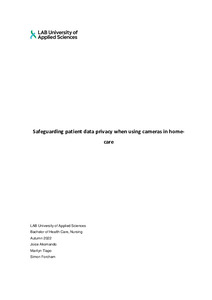Safeguarding patient data privacy when using cameras in homecare
Akomando, Joice; Tiapo, Marilyn; Forcham, Simon (2022)
Akomando, Joice
Tiapo, Marilyn
Forcham, Simon
2022
All rights reserved. This publication is copyrighted. You may download, display and print it for Your own personal use. Commercial use is prohibited.
Julkaisun pysyvä osoite on
https://urn.fi/URN:NBN:fi:amk-2022112624228
https://urn.fi/URN:NBN:fi:amk-2022112624228
Tiivistelmä
The use of surveillance cameras at home care enables families to keep track of the daily happenings and interactions of their family members or loved ones who are aging or have some disabilities that prevent them from carrying out their daily activities independently. However, the installation of cameras in the home care has arisen some critical ethical concerns; its obstructive and invasive nature. Surveillance cameras have been perceived as intervening into the privacy of the client thereby breaching the principle of confidentiality and data protection. This work therefore aims to address certain ethical issues that arise on safeguarding patient data privacy when using surveillance cameras in homecare.
This bachelor thesis work is aimed at providing an educational material on the ethical issues relating to the use of surveillance cameras in home care. The purpose of the thesis is to promote knowledge to future nursing students, nurses and other healthcare professionals on the ethical issues associated with the use of surveillance cameras in homecare.
The authors use practised based thesis method involving a commissioning party (NICCoLLa Project). Materials were collected from other reliable and credible sources. The research process was carried out in accordance with the guidelines laid down on ethical principles of Lab University of Applied Sciences. The PDSA (PLAN-DO-STUDY- ACT) model was used as a framework for this thesis. Feedbacks about the PowerPoint presentation were gathered through distribution of questionnaire in paper form to 20 different nursing students. The 5-point likert scale was used to collect and analyse the data.
Even though surveillance cameras can be invasive, a well-grounded ethical thinking and proactive response help reduce the risk and ethical challenges associated with it use. Therefore, in examining the ethical issue associated with surveillance cameras, it helps to reflect and enhance the current legislation.
This bachelor thesis work is aimed at providing an educational material on the ethical issues relating to the use of surveillance cameras in home care. The purpose of the thesis is to promote knowledge to future nursing students, nurses and other healthcare professionals on the ethical issues associated with the use of surveillance cameras in homecare.
The authors use practised based thesis method involving a commissioning party (NICCoLLa Project). Materials were collected from other reliable and credible sources. The research process was carried out in accordance with the guidelines laid down on ethical principles of Lab University of Applied Sciences. The PDSA (PLAN-DO-STUDY- ACT) model was used as a framework for this thesis. Feedbacks about the PowerPoint presentation were gathered through distribution of questionnaire in paper form to 20 different nursing students. The 5-point likert scale was used to collect and analyse the data.
Even though surveillance cameras can be invasive, a well-grounded ethical thinking and proactive response help reduce the risk and ethical challenges associated with it use. Therefore, in examining the ethical issue associated with surveillance cameras, it helps to reflect and enhance the current legislation.
